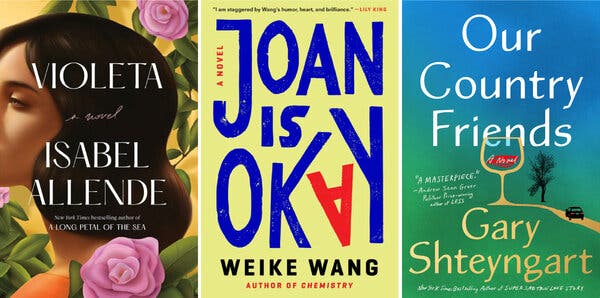To the Editor:
Re “Writers Wonder if People Want to Curl Up With a Covid Novel” (front page, Feb. 21):
Novelists fear they won’t get their readers on board by addressing worldwide illness, suffering and death? They probably won’t, as readers think: We all lived it; why would we want to read about it?
Sadly, there’s so much to be learned spiritually and emotionally by digging into the experience of the past two years, but we avoid the vulnerability of sadness and loneliness. Grieving is treated like an illness requiring “healing” instead of a universal experience of love that must find expression.
I’m glad that there are some novelists and artists willing to take a chance, along with their publishers. Their work might not be popular, but much of the world’s greatest art didn’t sell in its day.
Penny Parkin
Doylestown, Pa.
The writer is a licensed clinical social worker.
To the Editor:
Isabel Allende is quoted as saying, “The experience of the whole planet frozen in place because of a virus is so extraordinary that I am sure it will be used extensively in literature.”
I hope so. These years changed me, and I want to know how they changed others. Good fiction tells the truth.
I’ve been an advice columnist since 1994. One girl recently emailed me: “It’s been so hard to live life the way I’ve imagined. … So much of high school was from behind a screen, I don’t think I made the lasting memories I wanted to make.” Ouch. At least books — and even a Q. and A. column — can help her feel less alone.
Last year, I began writing a coming-of-age novel about two sixth graders who are uprooted during a pandemic. The boy and the girl become friends — and more. They even share a masked first kiss. Will it find a publisher? Who knows?
I hope editors say: Bring on the pandemic novels. But I can see why it’s a tough call.
Carol Weston
Armonk, N.Y.
The writer is the author of books for young people and an advice columnist at Girls’ Life.
To the Editor:
As both a retired neurosurgeon and a poet, I read your article about Covid novels and their readership with great interest. As reader and writer I have often found that the best literary treatments of serious issues come at the subject tangentially.
For example, Gary Shteyngart’s comic novel “Our Country Friends” barely mentions facts about the epidemic and never uses the name for the virus. The early and transient allusions to masks and social distance are made by a funny and somewhat neurotic psychiatrist.
I was also surprised to see no mention in your article of “The Plague,” by Albert Camus, the greatest novel about an epidemic ever written, in this case an imaginary outbreak in the 1940s with an analysis of social behavior eerily predictive of our recent experience.
My new book, “Necessary Speech: New & Selected Poems,” has an entire section of “Plague Poems.” The brevity of most poems, their use of tangential subjects (no mention of such terms as coronavirus or Covid necessary) and their attention to psychological subtlety may give them an advantage over most novels.
Michael Salcman
Baltimore
The Bravery of Photojournalists
To the Editor:
My admiration goes to the brave men and women photographers who risk their lives daily in the Ukrainian conflict. They provide us with vital firsthand, up-close photojournalism. They capture the essence of battle and suffering.
While serving in the Public Information Office in Vietnam in the mid-1960s, I asked photojournalists why they took such risks. They frequently said, “The shot was better when I got closer.”
We cannot predict where this conflict will lead, but because of the bravery of these photojournalists, we are sharing the excruciating ordeal of the Ukrainian people.
Albert Husted
Fort Lauderdale, Fla.
Ukraine’s Lithium: A Motive for War?
To the Editor:
Re “Before War, Race Was On for Ukraine’s Lithium” (Science Times, March 8):
As a former U.S. diplomat and university instructor, I can talk about geopolitical themes with the best of those trying to explain the Russian motives for its war in Ukraine. But your revelation about Ukraine’s largest in the world lithium reserves — and its meaning in terms of the electric cars of the future — suggests that we may have a war propelled by old-fashioned industrial greed.
If so, the West’s measured response, fearing nuclear confrontation, can now be ramped up to deny what may have essentially been a Russian attempt to reclaim the Soviet Union’s control of Ukraine’s resources.
Godfrey Harris
Los Angeles
Danger at the Intersection
To the Editor:
Re “Raising Crosswalks to Make Deadly Intersections Safer” (news article, March 4):
I am pleased to see — finally! — some practical action being taken to make crosswalks safer, but I notice that one element of risk in crossing our streets is essentially ignored.
In my Park Slope neighborhood, scooters and bicycles present a much greater danger than cars. They consistently run red lights, go the wrong way down one-way streets and ride on sidewalks. They almost always do these things at great speed, endangering themselves, pedestrians and even drivers who may have to swerve or slam on the brakes to avoid hitting them.
These raised crosswalks will, I think, force the cyclists to slow down, though I wonder — since they ignore signs and lights anyway — how many will still go full speed ahead and be thrown off their bikes.
The city really needs to start examining ways to hold both delivery and leisure cyclists to the law, for the safety of all.
Linda Strang
Brooklyn































